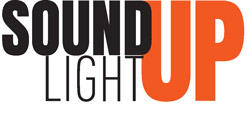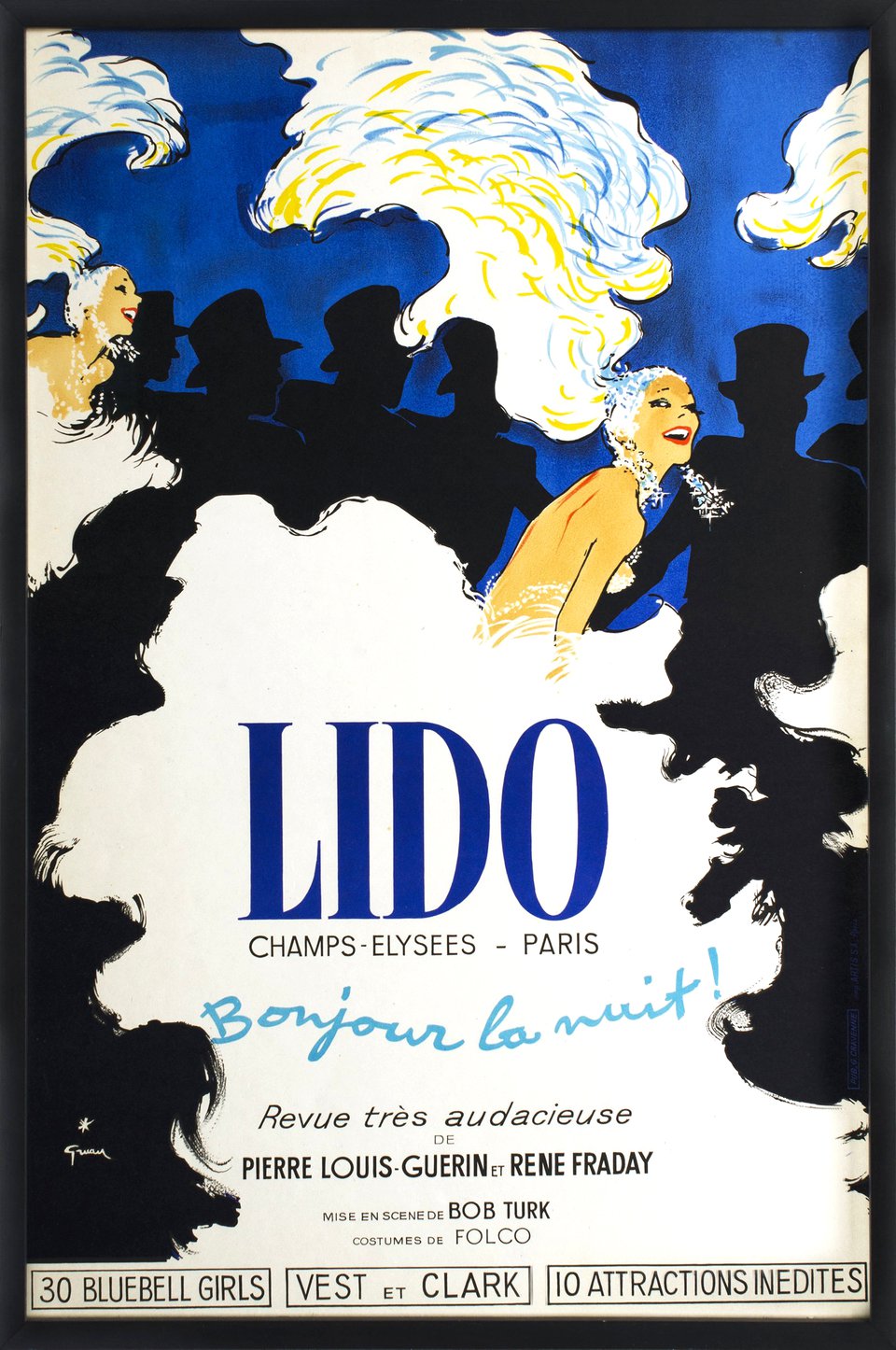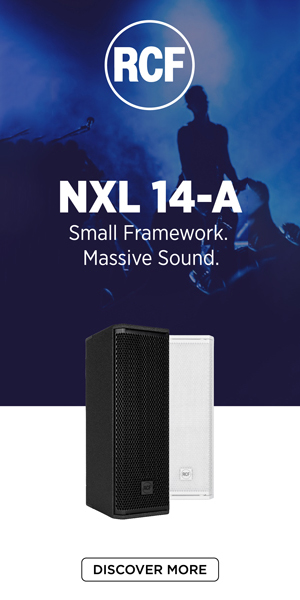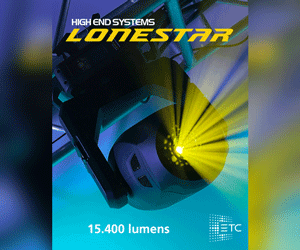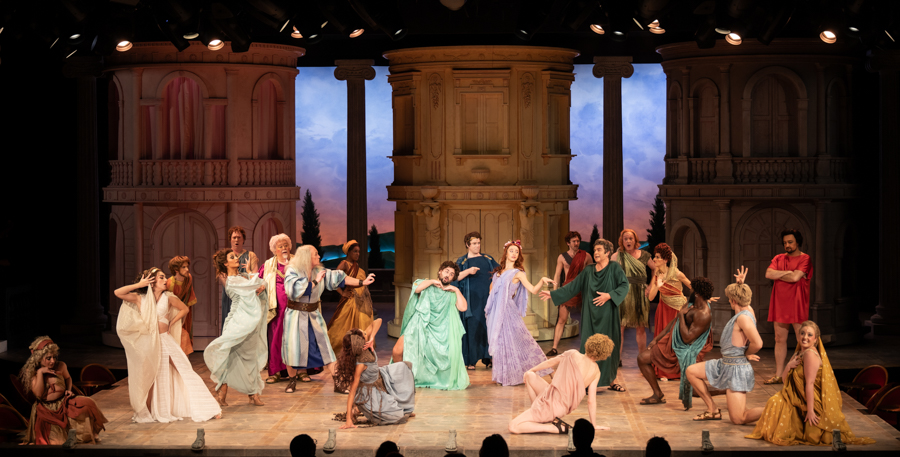
Supported by artists mainly from London and New York, Jean-Luc Choplin, the new director of Lido 2 Paris, accompanied by the Accor group, has launched a series of investments with the aim of an in-depth renovation of the main room and the acquisition of a brand new ETC Sensor3 system, two ETC Apex consoles, and a brand new Elation kit.
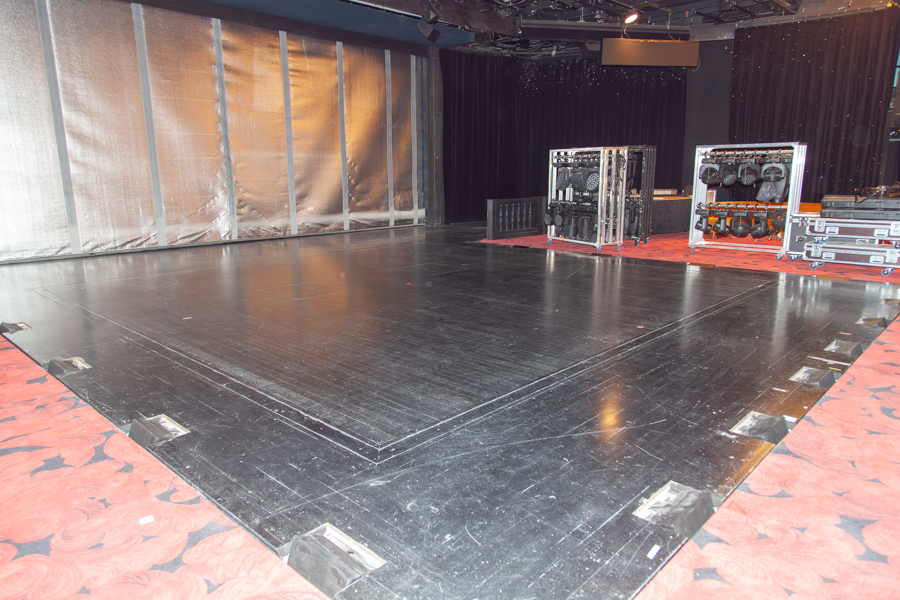
When you enter the Lido, the ground floor corresponds to the balcony level. Go down one floor and you arrive at the zero level of the room which has more than one trick up its sleeve by taking you down another meter before the show to reveal a stage thanks to a clever movable floor system (the famous Lido effect).
To ensure a new musical/theater program, the Lido is coming out of an 8-month-long facelift of work and 3 months of renovation. I meet up with Eddy between the two shows. “Forum” has just finished and the crew is tackling “Rocky Horror” for a premiere in March.
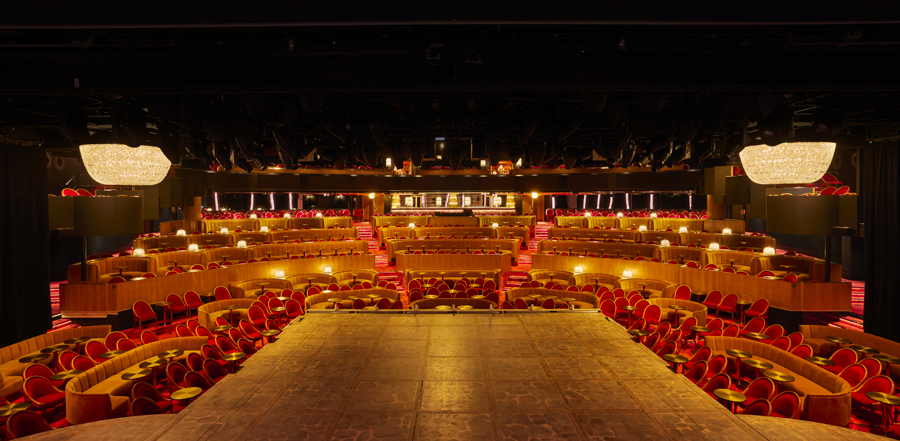
SLU : What technical investments have been made here?
Eddy Couloigner : “The idea was to renew this equipment because the old ones were no longer functional with regular breakdowns. We worked hand in hand on the refurbishing part with Cyril Auclair & Léonard Françon from Unisson Design.
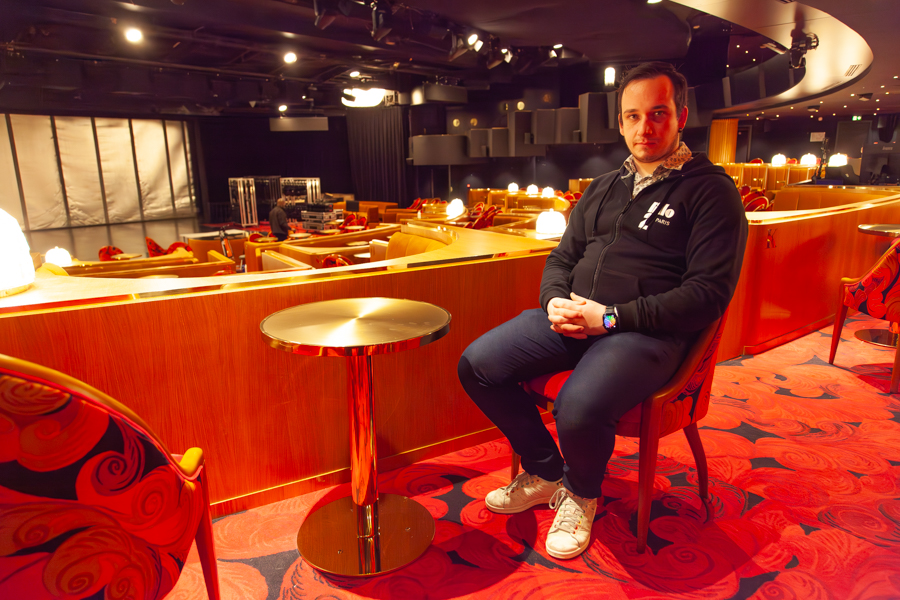
For my part, I am a service provider on the lighting side through the company GTC, so I am an associate.
Among the major renovations, we have redesigned the network by switching to a system that is capable of managing the welcoming of international creations and provides more flexibility to become a real performance hall. This resulted in a brand new lighting kit, mainly using Elation.”
Indeed, taking advantage of a restructuring and an overall renovation, Eddy, who had already worked for Jean-Luc Choplin at the Marigny theater, began his work as General Lighting Manager while the walls of the Lido were literally stripped.
History of the Lido
Before the 1970s, the Lido cabaret’s address was 78 Avenue des Champs-Élysées. Then the Clerico brothers, owners, moved it near the George-V metro level and the Lido shared its entrance with a movie theater under rental lease. The Lido institution, as we know it, appears.
After many years of operation, it was sold to the French company Sodexo, its food supplier (caterer), to pay unpaid bills. The group took over for seven years but did not meet with the success hoped for. During the same period, Hollywood released the film “Moulin Rouge”, a box office hit that directed tourists from all over the world toward the competitor of the same name.
In 2023, the Accor group becomes the owner of the Lido for a symbolic euro and appoints Jean-Luc Choplin as manager. The objective of reinventing the Lido formula is an interesting challenge for someone who « aime avoir les mains dans le cambouis et travailler au plus près de ce qui se passe en scène jusqu’au bout ». Exit the catering part during the shows, but also the revue and the French Cancan, in favor of in-house or welcoming creations based purely on Music Hall. The programming changes every 3-4 months and the Lido is kept up to date.
The network and lighting desk
The lighting control room is installed in an “old-fashioned” way in a small room above the main room and separated by a large bay window. Even if today this concept does not seem ideal, it has the advantage of protecting the best seats in the venue and of being located near the Robe Robospot, which facilitates communication between the console and the follow-spot operators.
A brand new ETC APEX 10 lighting desk
Concerning the choice of desks, Eddy explains : “On Broadway, we all work in ETC and the management’s thinking was to say: if one of our shows goes to Broadway or London we must be in ETC and vice versa for us when welcoming shows. Hence the Lido went for an ETC Apex 10 active et une APEX 5 en backup. An EOS server runs the cues and shows every night.”
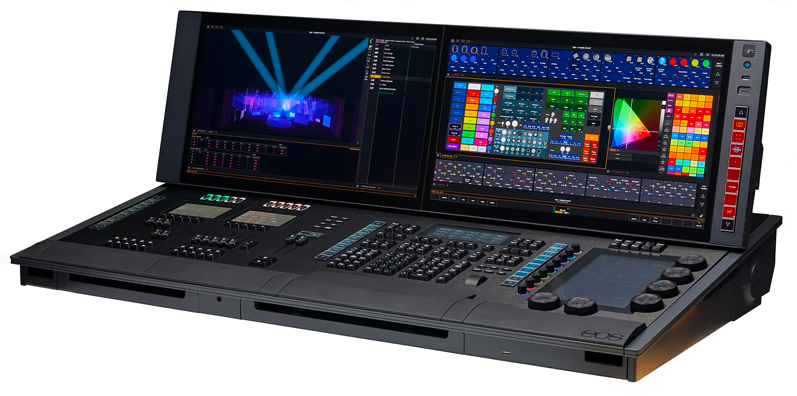
The brand new ETC APEX 10 console is a little gem of technology. Its strength is provided by dernières nouveautés logicielles apportées par la version EOS 3.2, it is capable of:
– Using a powerful and user-friendly syntax for programmers of all levels
– State-of-the-art tools for controlling colors
– Magic Sheets for programming and personalizing views
– Programming environment and visualization with Augment3d
– The Virtual Media Server for pixel-mapping
– Integrating timecode and automation
– A multi-user and multi-programmer workspace
Furthermore, it offers an elegant control interface designed for the comfort of lighting engineers and console operators with very advanced customization offered by buttons topped with small LED screens (customizable so-called Target keys for direct selections), an integrated flexible keyboard, and a touch screen.
Its programming surfaces are generous, and it has high power for complex lighting and video installations such as at Lido as well as output allowing the control of 24K parameters.
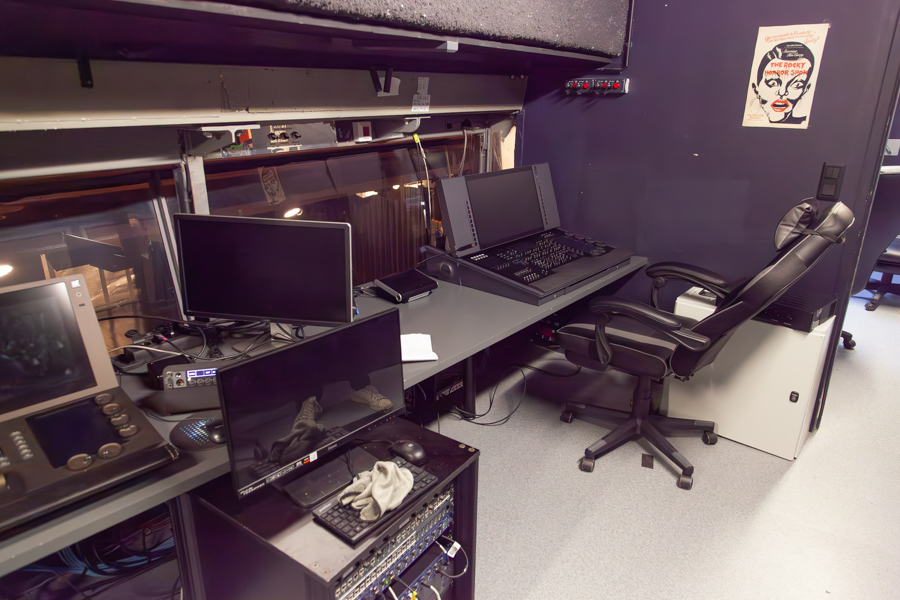
SLU : What do you like, personally, about the new ETC APEX?
Eddy Couloigner : “The control buttons with small screens are shortcuts that allow you to go very quickly, especially those located in the wheel area. If the lighting designer wants us to do a little pan, a little tilt, and correct the colorimetry, if he has the player in the right place, we don’t need to change the program we are in and we have everything at hand. Reacting fast is necessary because rehearsals here only last three weeks.”
Indeed, we quickly understand that for around twenty actors, the rehearsals are quite busy. The crew must readjust the show in relation to the space available, the kit, and the sets. “We need to review the positions and dances. We could rather talk about technical and artistic rehearsals” underlines Eddy. “Also since the space is not very big, everyone cannot work at the same time. Light, sound, and video have slots and everything comes together at a certain time. So these are three weeks of fairly intense creations.
SLU : You have two consoles, I imagine that this is part of the objective of facilitating creations…
Eddy Couloigner : Indeed, one is used for the visiting desk operator who generally works in the morning and another for the Lido desk operator, in the afternoons and evenings during rehearsals. One can do his Go without disturbing the other who, for his part, continues to work on his palettes and positions, etc. The idea of this management is ultimately to produce one or two creations per year.”
Protocole and networking
The two ETC APEX 5 and 10 consoles are connected in an sACN network to 4 ETC Sensor3 dimmer cabinets. The venue thus offers the versatility necessary to meet the very diverse demands of the visiting crew. The new owner, the Accor group, having also signed an agreement certifying the transition from filament lamps to LEDs in the equipment in its portfolio of activities, the Lido opted for direct power from ETC with the sensor3 system. Exit the dimmers.
Eddy adds : ” This is an interesting system because it allows you to control the switching on or off of each fixture, which is much simpler for lighting engineers if they need to do a hard reset independently from the control room. ”
sACN is a multicast protocol that allows the network architecture to benefit from IGMP Snooping, and multicast flows only to equipment that has subscribed to flows, so we do not “spray” (send info to) equipment that does not need it. This is what we call on-demand networking. Furthermore, the theater might host grandMA consoles for events for example, and therefore would not be able to use ETC-Net.
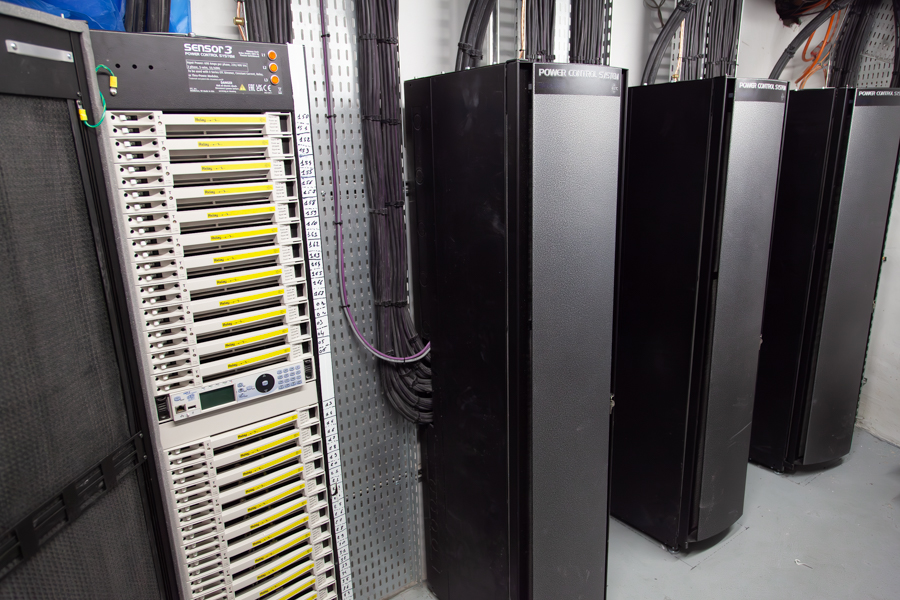
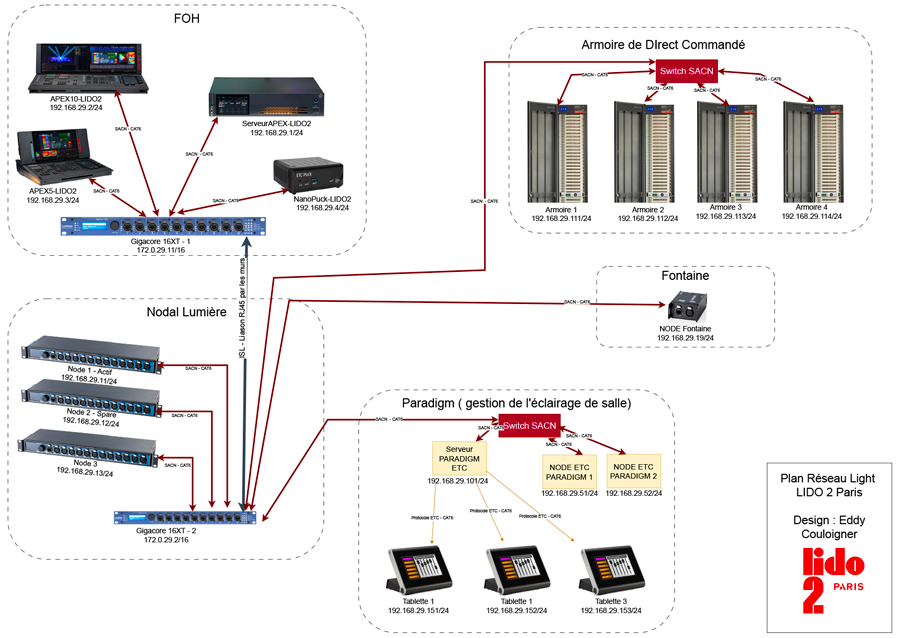
Luminex GigaCore 16XT switches make the connection between the control room and the lighting node. Then nodes and patches recover the network to reach the light kit. They are placed everywhere depending on the needs for DMX outputs such as the water fountain for example.
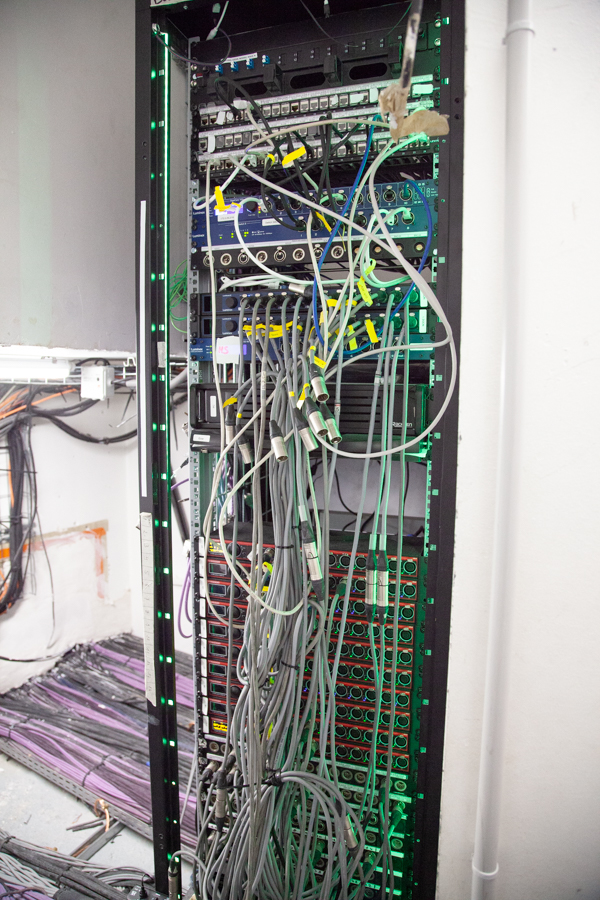
Eddy Couloigner : For the lighting network, fiber and RJ45 had already been installed in the walls but we ultimately only used network cable with RJ45 for cost reasons because we only cover small distances. New points have also been added at the stage level and the lighting grid to, in the future, be able to connect the fixtures to the network.
SLU : Which protocol are you using?
Eddy Couloigner : We have a bit of ETC-net dedicated to the remote control to send channels or cues from phones. Otherwise, we chose to switch to sACN because it is an ideal protocol for tracking, which is the case for sound.
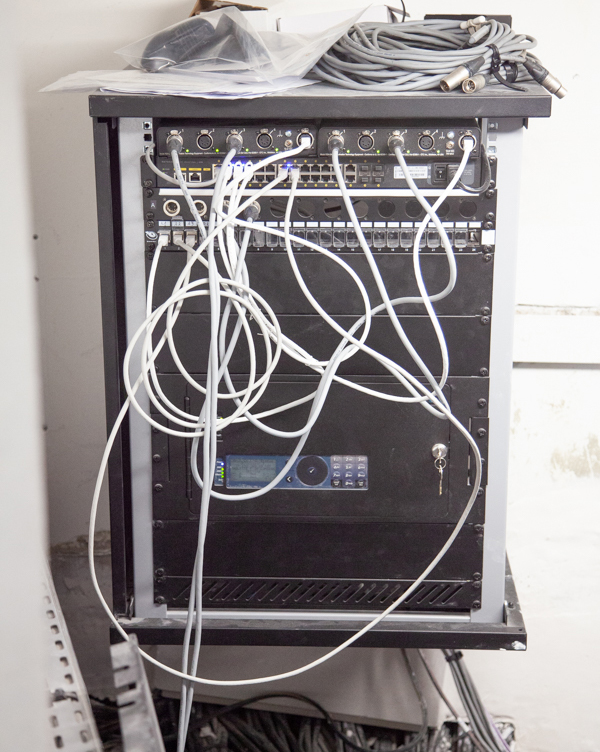
The 2nd reason is that the main room lighting is controlled via a Paradigm ETC system with switches that have a lower priority than the lighting console.
As soon as the lighting console turns on, this neutralizes these network switches. No one could turn them on during a show but conversely, when you turn off the lighting console, the switches take over for the cleaning crew, for example.
The ETC Paradigm system offers sophisticated lighting control from small installations to complex systems. With its advanced applications, it allows energy savings thanks to automatic presence detection or management of natural light (for certain cases). It also integrates energy management tools, such as consumption monitoring, and can produce regular reports.
The lighting kit
With a very low height under the lighting grill of 5.5 meters, none of the pipes can descend and it is impossible to go upwards because the upper floor is occupied by a cinema. But if there is no real height, the depth under the stage is relatively significant and extends over 6 meters with the possibility of traps (trap doors) in different places linked to the “Comète system”. At the front of the stage, 2 black risers can be interchanged and, if necessary, reveal a fountain or an ice rink.
For the rigging, rails support the kit for impeccable lighting of the stage, but which should not blind the spectators. “The ceiling being low, we selected fixtures that were small enough not to disturb the human eye and which did not make too much fan noise to avoid a permanent hum. Ultimately the Elation Fuze range seemed the most suitable to us and fit within our budget. Three-quarters of our kit is made up of Fuze Max Profile, Fuze Profile, and Fuze Wash FR.”
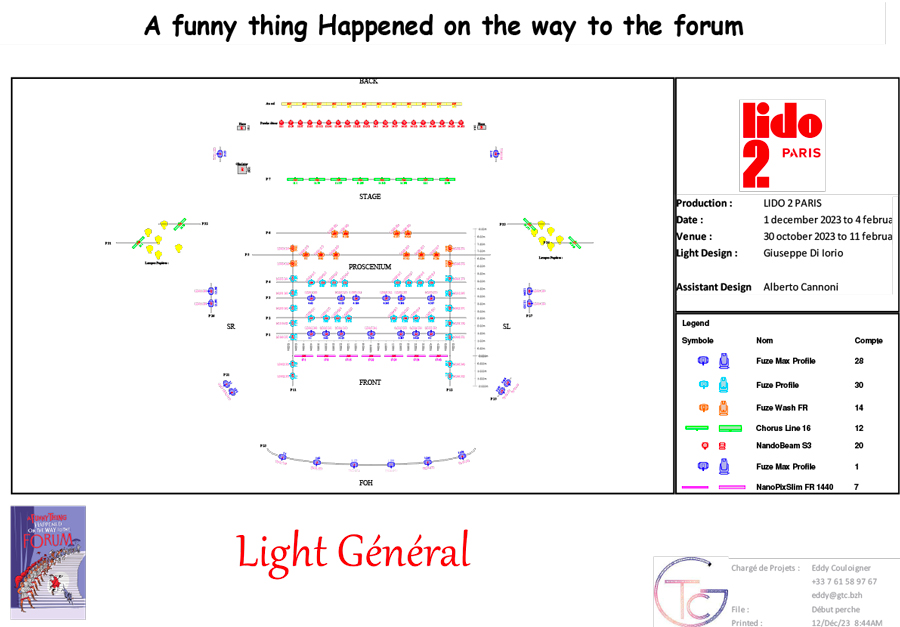
On the musical “A Funny Thing Happened On The Way To The Forum”, on the front and side, we have 14 Elation Fuze Max Profiles. These fixtures are equipped with an 800-watt RGBMA LED engine which operates in additive synthesis and is capable of delivering 21,000 lumens. Their zoom range extends from 7° to 53°. To ensure color fidelity, Elation guarantees a CRI of 92.
Then there are two rows of Fuze Max Profiles along with 4 rows of Fuze Profile (two overhead and two on the sides). The smaller version of the Max Profile displays the same RGBMA engine specifications and the same CRI level for good homogeneity and a flow of 10,000 lumens for 305 watts.
Its zoom range extends from 7° to 42°. More focused on versatility than on breaking flow records, this fixture inaugurates a new stage in the Fuze series. With its hyper-competitive price, it is designed to adapt to all types of use.
Next come two lines of Fuze Wash FR with their Fresnel lens which does not blind the spectators, unlike multi-source washes, as requested by Eddy, who is concerned about this major point. Its zoom range extends from 9° to 60° and it delivers 15,000 lumens for 480 W of LEDs with the same specifications as RGBMA LED engines from the Fuze family.
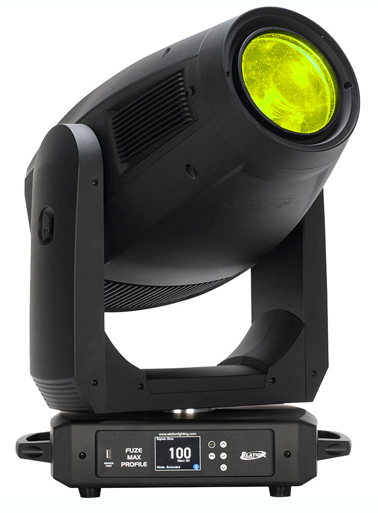
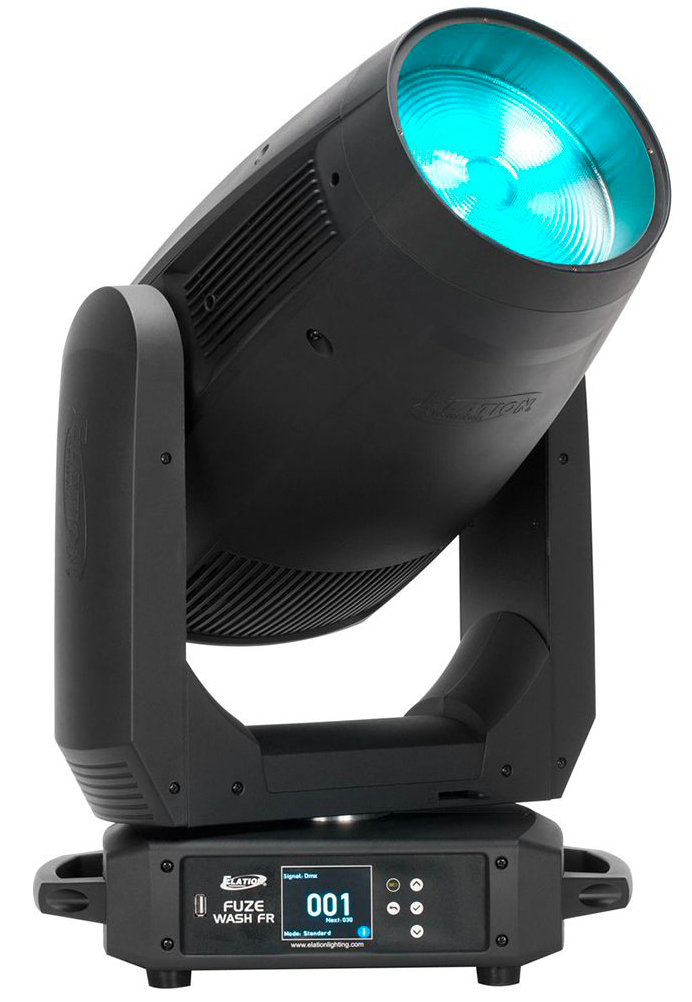
Sixteen Elation Chorus Line 16 allows you to animate the decor in-depth and create effects. These motorized bars are also installed on the track. With their zoom of 4 to 40° they reinforce the light produced by 20 Ayrton NandoBeam S3s already present before the renovation of the Lido, as evidence of their durability. With a very small footprint, this small automated Wash with 19 sources of RGBW LEDs fits anywhere and is capable of 4,000 lumens with an opening of 8° to 40° which gives it great versatility.
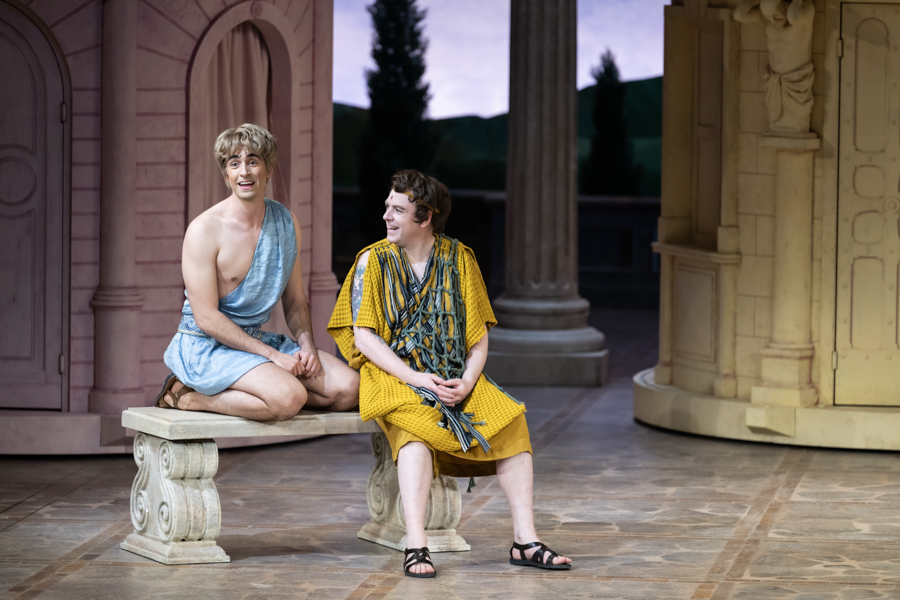
These two types of fixtures are reinforced with the backlighting by the Dalis 860 fixtures, excellent cyc lights for beautiful cyclorama covering. With a consumption of 300 Watts, each Dalis ramp has eight shades of LEDs: RGB, royal blue, amber, cyan, warm white, and cold white. Patented asymmetrical microreflectors provide homogeneous light distribution in addition to controlling each color on 8 or 16 bits in four independent sections. Its fanless cooling system makes it the “must-have” of theater lighting designers.
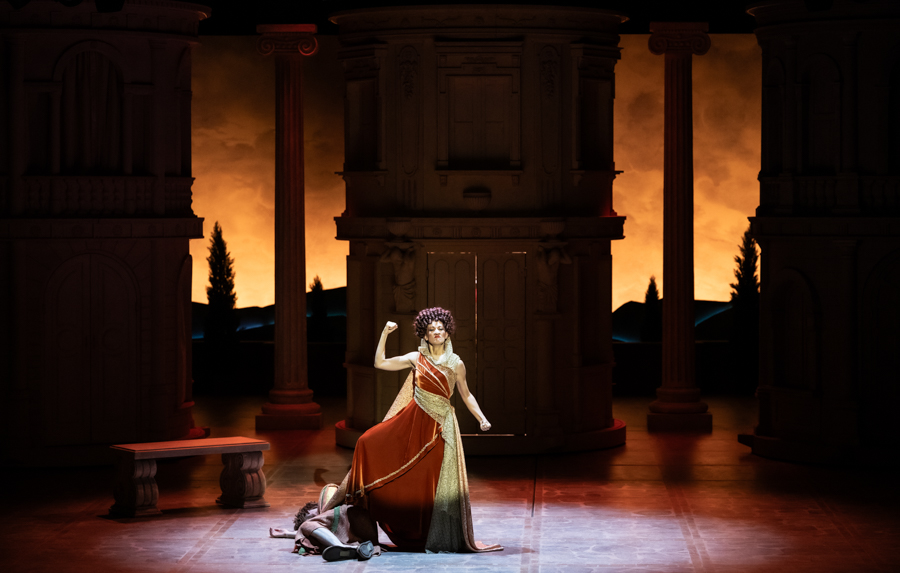
SLU : Who did you work with on this project?
Eddy Couloigner : We went with Best Audio & Lighting for the purchasing part and through Dushow for the rental. They are people that I like and with whom it is easy to work. It’s Boris Jacob, who I find very cool, who took care of this project. Half of the lighting kit is therefore under long-term rental and the other half was purchased by Lido.
SLU : Could you give me your opinion on this lamp to LED transition?
Eddy Couloigner : We manage to find the shades of a lamp to such an extent that spectators do not see the difference between the Conventional and the LED. It’s a lot of work on the CTO and it works very well. For our part, we therefore do not feel the impact of the LED and have never had any complaints from the actors, which is very positive.
There is also a practical side because no pipe can be lowered and changing the lamp would be very complicated for the technical team on site. LED requires much less after-sales service.
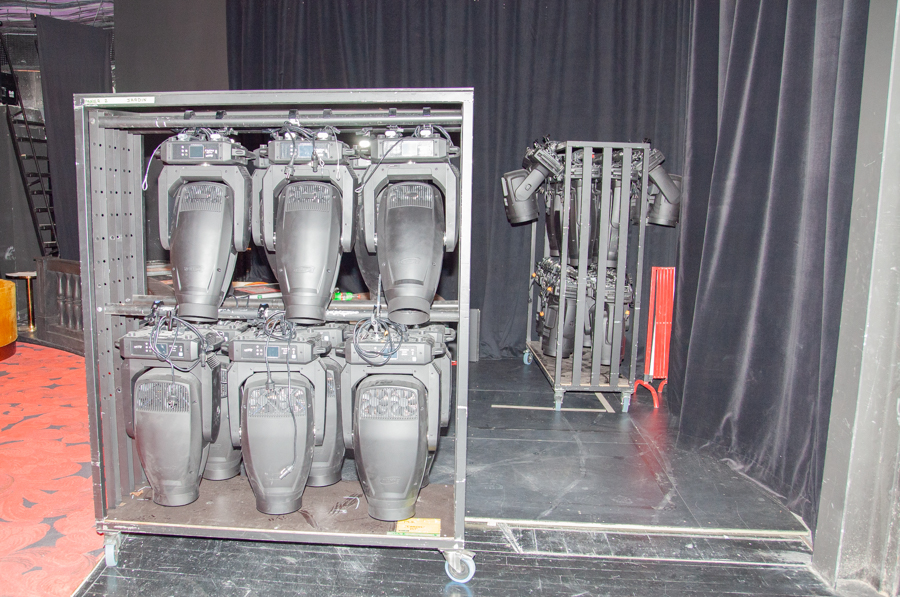
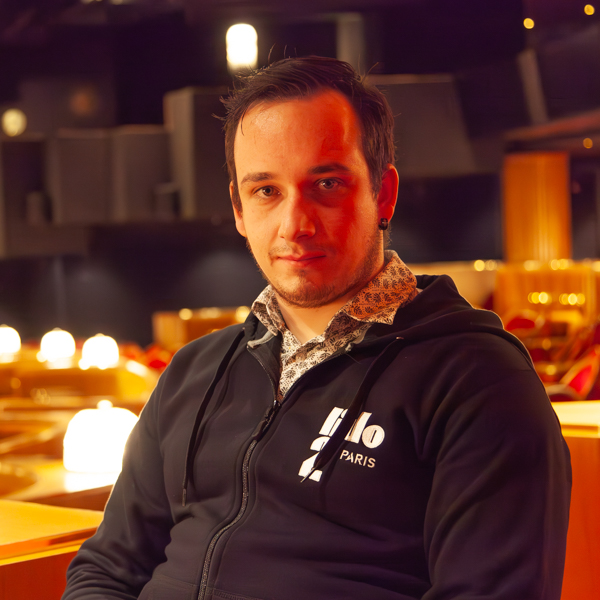
Eddy Couloigner
After a BAC+2 in lighting management enhanced by a year of Bachelor’s degree in network administration at the CFPTS, he began his professional career as a technician and then lighting manager. Coming out of Covid, he joined Frederic Hamonou who had already set up his company and became associated with GTC (Global Technique Concept).
Eddy adds : “He has already worked on quite a few projects, and I am learning a lot with him. Today, I know how to manage a lighting project from A to Z and technical management fascinates me. It’s a very good experience.”
Building on a good collaboration with Jean-Luc Choplin on a previous project, he responded to a call for tenders and won over the Lido lighting contract, which he added to his portfolio of projects including festivals as head of lighting onsite or technical direction (Printemps de Bourges, Main Square, Lollapalooza).
SLU : How would you define your work at GTC?
Eddy Couloigner : “We intervene at the project study level. We do not provide equipment or technicians but we offer our know-how to assist venues like here at the Lido or festivals. I am very attached to everything that involves project management and support for the renovation of premises, that is to say: responding to consulting missions throughout the duration of the work right up until the opening.
This concerns support for consulting companies, architects, and technicians on site who are not necessarily used to this type of project. I offer them the most suitable technical solutions. Based in Bréal-Sous-Montfort near Rennes, Eddy and Frédéric operate mainly in France but also internationally.
Public spaces completely redesigned to immerse the public in the dream and artistry of the Lido
Indeed, due to the lack of ability to recover space upwards, the entire technical philosophy consists of playing on the appearances and disappearances of scenery from…the basement thanks to the “Comète” freight elevator (platform) system installed in the 2000s.
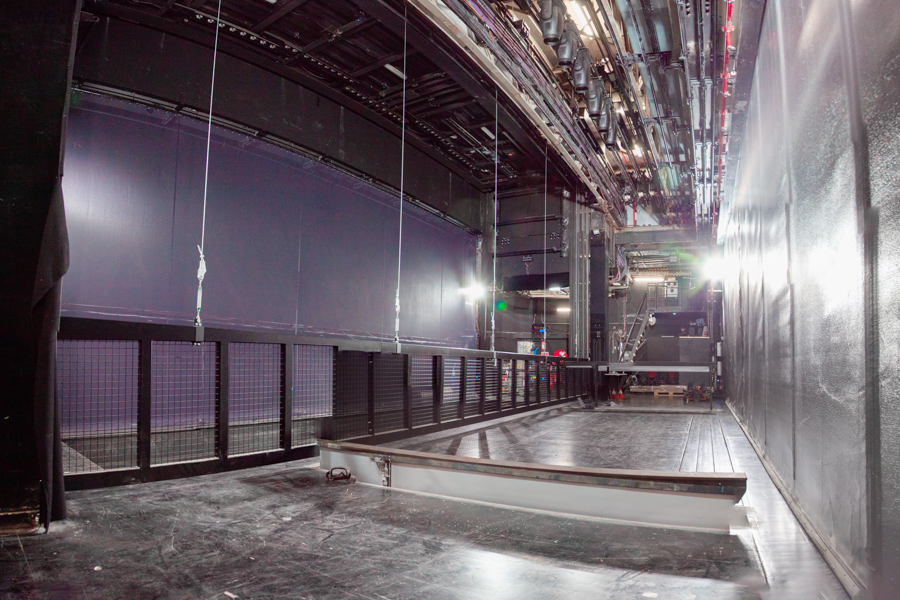
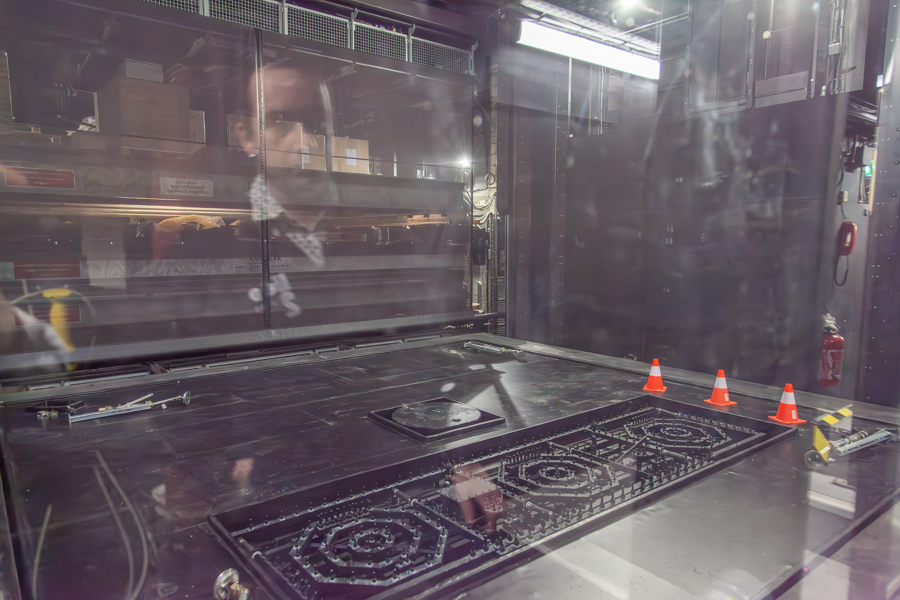
Eddy Couloigner : “Thanks to the freight elevator which can support up to 6 tonnes, the Lido compensates for a stage that is not very deep. It allows you to evacuate stage sets, open a trapdoor on the ground, or bring out elements to create appearance and disappearance effects. It also manages the fountain and also has an ice rink which is not in use at the moment. It is a system developed for aircraft carriers with storage drawers on which you can place the sets to store them under the stage. In total, three electromechanics are employed for its maintenance.
SLU : The Lido was well known for its fountain, is it still in use?
Eddy Couloigner : This is the heart of the system and will soon be improved to produce other water effects. The idea would be to have fountains all around the main basin which accommodates it by multiplying the current module by four. This would result in a larger fountain with larger volumes of water. We worked with Aquatic Show, based in Alsace, a service provider specializing in this field which works, on other shows such as, “Water Madness” at the Grand Rex.
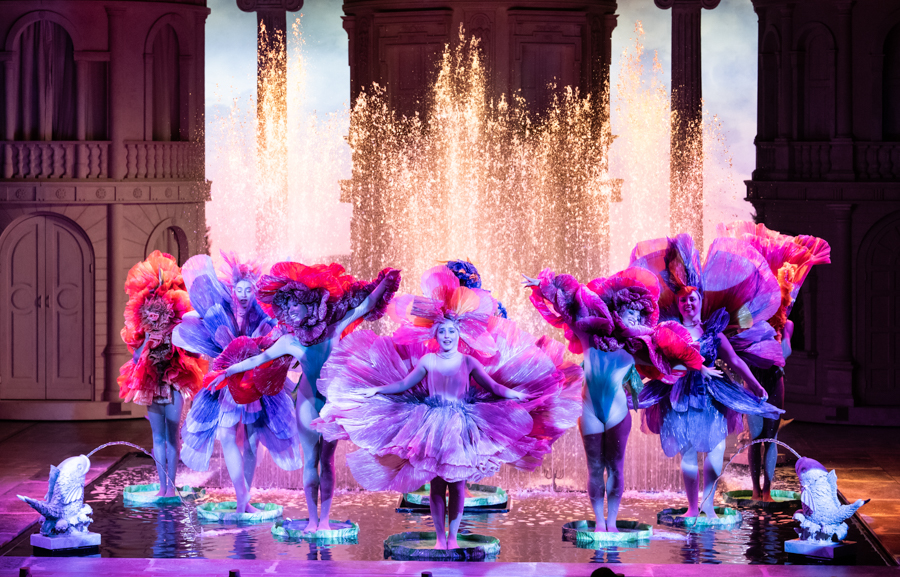
SLU : Are the water effects controlled via a Time Code?
Eddy Couloigner : Basically, it’s the usual process but with a live orchestra of 19 musicians led by a conductor, we have the constraint of live music. The idea is therefore to work in a series of cues to be able to adapt as best as possible. I enjoyed our collaboration and I find their creations very pretty.
The main room welcomes a new balcony space that takes the place of the classic follow spots, themselves replaced by two Robe RoboSpots set up in the control room.
Eddy Couloigner : The problem with these old follow spots is that they could only hit the proscenium, due to the low ceiling height. The RoboSpot therefore provided greater working latitude. It is associated with two Robe Esprite installed in the room.
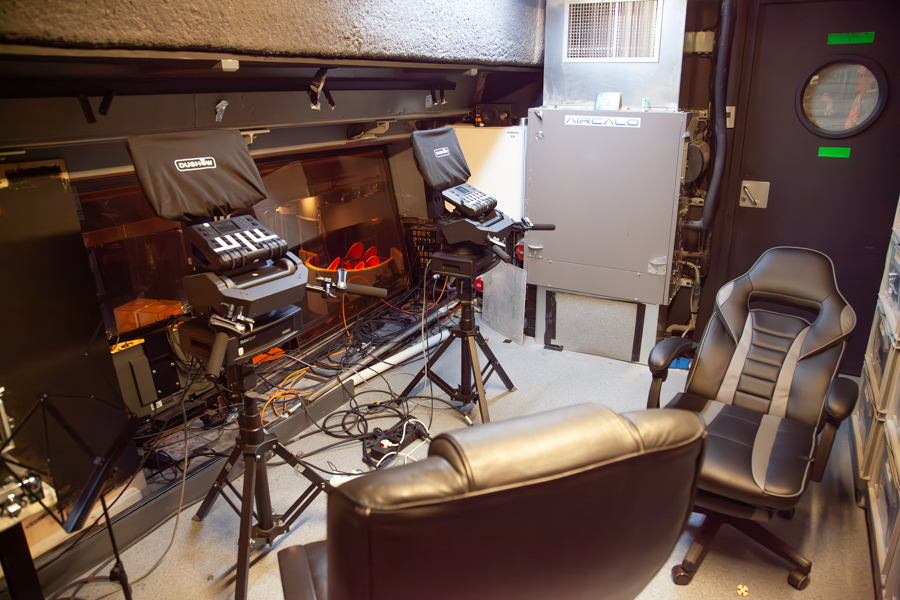
SLU : The follow spots are they pre-programmed or cued by the lighting desk or do you have technicians operating them entirely?
Eddy Couloigner : This is an important question for us. If for certain artistic reasons, a lighting designer prefers to keep control of the dimmer to have blackouts and light-ups in sync for example, we can always reorganize ourselves but personally, even if it means working with real dimmers, I find it more interesting to give the technicians complete control. Otherwise, you might as well use completely automated systems.
SLU : Is that something you are looking into?
Eddy Couloigner : We thought about it but as things currently stand, the flexibility that these systems could give us is not yet optimal. Gateways like the PSN with the grandMA for the EOS are missing to avoid “shaking” problems.
Furthermore, there is a need for real programming time in creation, that is to say, we cannot consider these systems as plug-and-play which would not make it possible to meet the demand for a lighting designer to switch from one projector to another instantly because it takes time to calibrate. But, in the end, at the Lido, the sound is tracked and the idea would ultimately be to have a common system.”
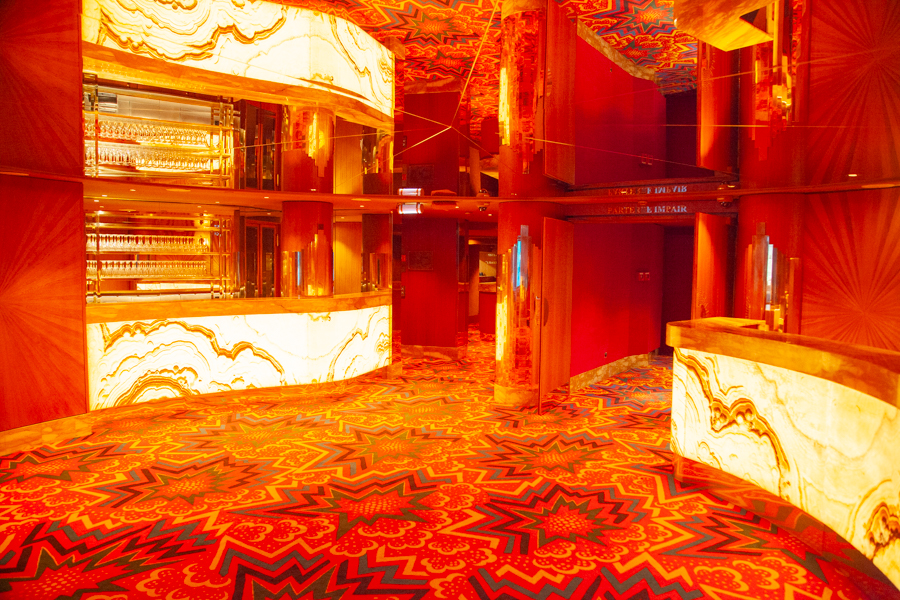
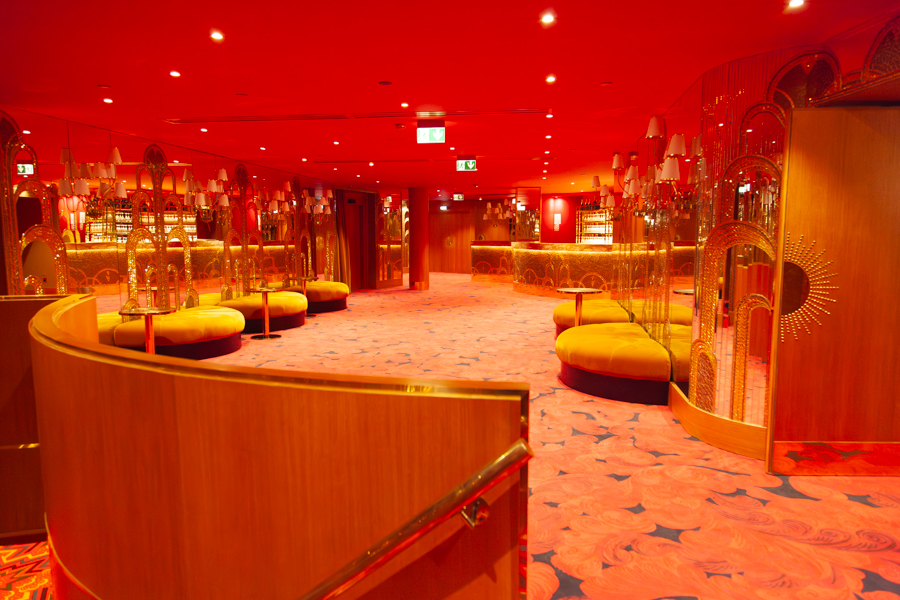
The wall and ceiling of the 35 meters of the entrance are now completely covered with LED panels.
Eddy Couloigner : Alabama (provider company) provided us with the LED wall. The panels are Absen NX1.8 on 220 m2 which has a very tight pitch to the eye of 1.87mm, which is perfectly suited for this type of use, and Absen AW2.5 with a pitch of 2.5mm on 5 m2. The overall installation is controlled by a Novastar MX40 processor.
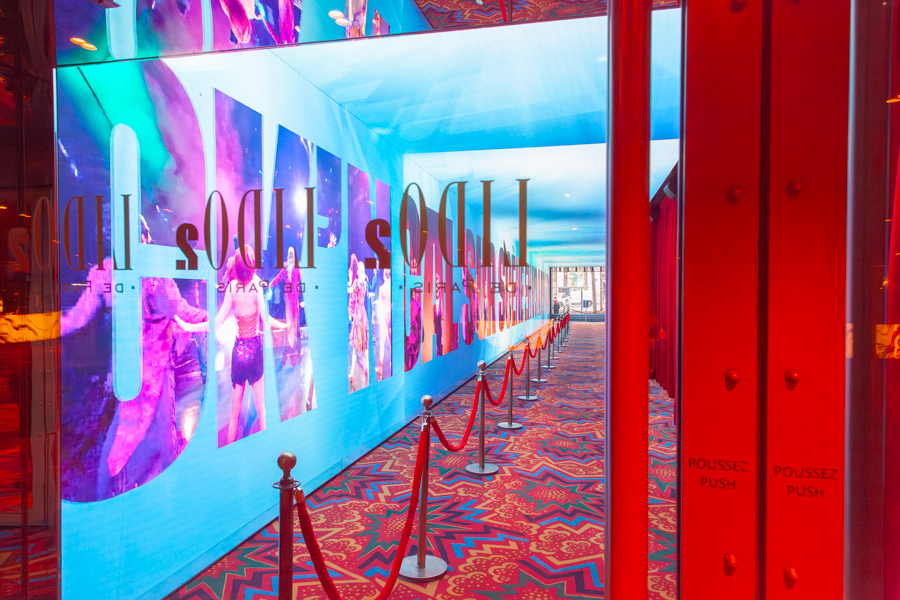
The Lido 2 Paris with its new installation has given a new life to a historic place on the Parisian scene with a fabulous entrance made entirely of a LED wall that takes spectators into another universe. Creations and hosting of Music Hall shows from all over the world will be able to follow one another under the spectators’ enthusiastic gaze.
To be up to the task, the Accor group and the new director of the Lido Jean-Luc Choplin have not compromised on the technical aspect. Two APEX 5 and 10 consoles will host and create superb shows performed by Londonien, New Yorker, and Parisian artists.
They will be lit by a remarkable Elation and Ayrton kit that is both powerful and compact, to be installed in the historically restricted space of the Lido. An sACN network also allows extreme flexibility and is associated with the ETC Sensor3 system and the ETC Paradigm system, precise, secure, and communicating light control.
Congratulations to Eddy Couloigner and Frederic Hamonou of Global Technique Concept for managing this large-scale renovation project with a skillful and virtuoso hand!
For further information on:
– La gamme de consoles APEX
– Le système Paradigm
– Le système Sensor3
– La gamme de projecteur Elation Professional
You might like to read Unisson Design spatialise le Lido 2 Paris

